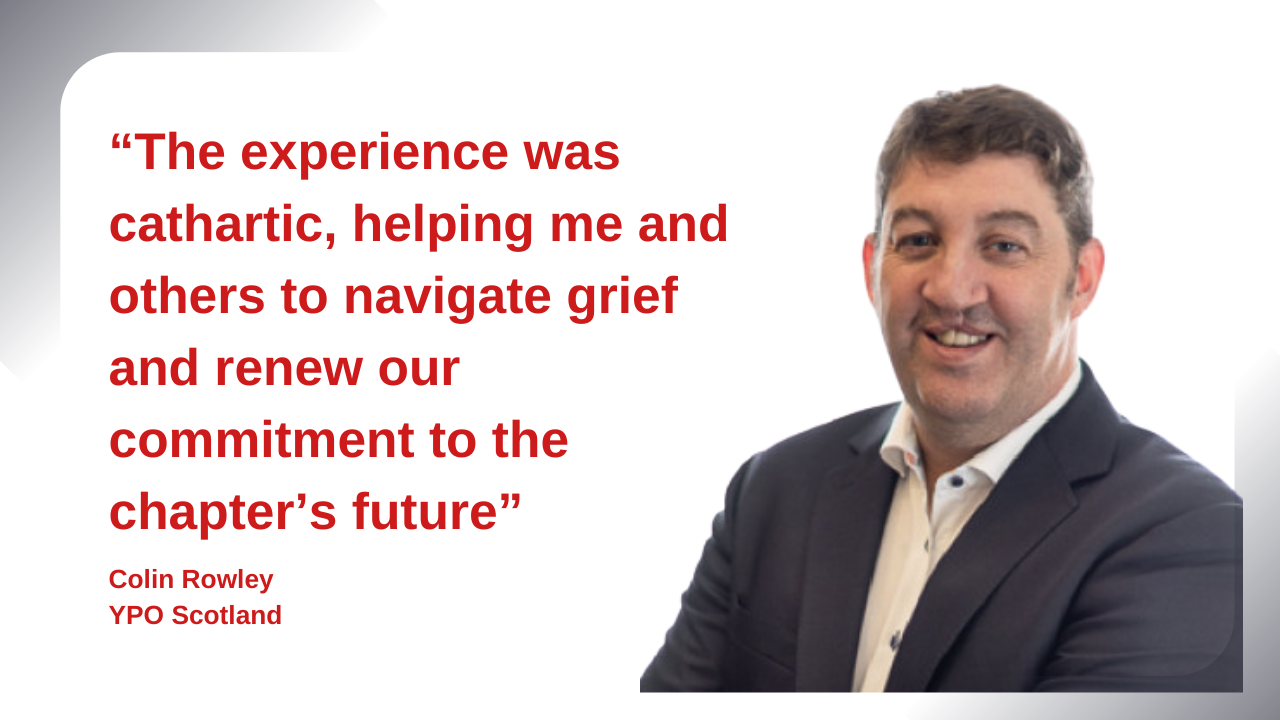How improv can help navigate grief and build resilience
In the corporate world the sudden death of a well-loved leader can be deeply disruptive, affecting the morale and cohesion of the entire organisation. When YPO Scotland lost its chapter chair, Mark Williams, the organisation was faced with the difficult challenge of how to manage this profound loss, particularly as it coincided with a major event – a Christmas gathering already planned for members and their families.
YPO Scotland, part of a global membership organisation spanning 150 countries, was formed in 1986 to help Scottish business leaders share ideas and learn together. Williams had been more than just a leader; he was a friend and mentor to many within YPO Scotland.
His sudden passing just six weeks previously left a void and the chapter was struggling with how to honour his memory while also fulfilling their need to connect as a group. The upcoming Christmas event, which was originally planned as a festive gathering, now carried the heavy burden of being the first time the group would come together since Williams’s death.
Colin Rowley, interim chair, and Alice Bradley, chapter manager, were faced with a tough decision: should they proceed with the event as planned or cancel it out of respect for Williams? After thoughtful consideration and discussions with Neil Mullarkey, an international expert in using improv for leadership development, they decided to move forward, turning the event into an opportunity for collective healing.
Improv as a tool for compassion and connection
Mullarkey, known for his ability to enhance communication and emotional intelligence, was brought in to lead the group through an improv session designed to break down barriers and foster a sense of unity during this emotionally charged time. Understanding the sensitivity of the situation, he designed his session to be more than just a festive activity; it was intended as a crucial moment for members to reconnect, share their grief and begin to move forward together.
The session began with an act of remembrance for Williams, attended by his widow, Nicola, along with other members and their spouses. This set a compassionate tone for the event. Mullarkey then seamlessly transitioned the group into a series of improv exercises including word association games and the "yes, and" technique, which encouraged spontaneous, positive communication and helped participants engage with one another in a safe, non-judgmental space.
Execution and impact: transforming grief into a source of strength
Mullarkey’s approach was a delicate balance of sensitivity and creativity. His ability to read the room and create a psychologically safe environment allowed the participating CEOs, chairs, managing directors and managing partners – many of whom were accustomed to maintaining control in their professional lives – to let down their guard and connect with others on a more personal level.
As the session progressed the initially heavy atmosphere began to lift. Laughter, a powerful tool for reducing stress and fostering connection, became more frequent, helping to ease the emotional burden. Mullarkey’s exercises, which require active listening, quick thinking and collaborative effort, not only facilitated open communication but also helped to re-establish trust and camaraderie among the participants.
Bradley notes that the session was particularly effective for those who were hesitant at first. The activities allowed them to step outside their comfort zones and engage with their peers in a new way, demonstrating the value of vulnerability and collaboration during difficult times.
Lessons: Building resilience through improv
The impact of Mullarkey’s session extended beyond the immediate event. Several key outcomes emerged:
Enhanced emotional intelligence: The improv activities helped members to better understand and manage their emotions, fostering empathy and self-awareness, which were crucial in supporting each other through grief.
Strengthened team cohesion: By engaging in shared activities that required trust and collaboration, members rebuilt and strengthened their connections, which was vital for the chapter’s cohesion during this challenging time.
Stress reduction and healing: The session provided a much-needed outlet for members to relax and process their emotions, helping to reduce the stress associated with the recent loss and begin the healing process.
Improved communication: Participants learned to listen more actively and communicate more openly, skills that are essential in both leadership and the grieving process.
Resilience building: The session helped members to develop resilience by embracing discomfort and uncertainty, crucial traits for leaders facing both personal and professional challenges.
Rowley reflects on how the session gave him the confidence to continue in his leadership role despite the challenges. The experience was cathartic, helping him and others to navigate their grief and renew their commitment to the chapter’s future.
Improv: A blueprint for compassionate leadership
The success of this improv session highlights the potential for innovative approaches like Mullarkey’s to address deep emotional challenges in organisations. By fostering a psychologically safe environment and encouraging open communication, such methods can help leaders and their teams to navigate difficult times with resilience and empathy.
For HR professionals and leaders this case study serves as an innovative example of how to handle the delicate situation of losing a beloved team member. It shows that with the right tools and approaches, it’s possible to honour the memory of the lost individual while also helping the team to heal and move forward together.
Enjoyed the story? Pop your details in below and I’ll send you the neatly packaged PDF version – something you can save, pass on to colleagues or pull out when you need a spark of inspiration.

